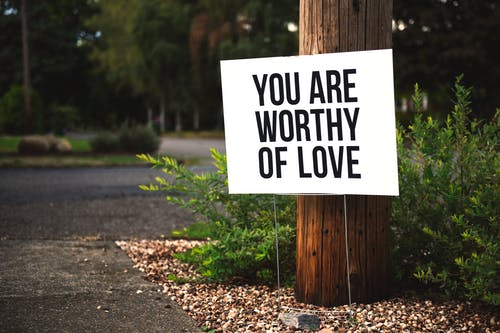Our relationship with our ‘self’ is influenced by our self-value, which is dependent on our self-worth, self-respect and self-esteem. These aspects determine how we feel about ourselves, what we think we our capable of, and what we feel we deserve. When these aspects exist in the extreme – too much self-value (self obsession: to only consider your own feelings and not consider anyone else’s feelings) or too little self-value (devaluing self: to only consider others’ feelings), an imbalance is created in our psyche. When you have low self-value, you constantly feel slighted, upset, anxious, or unhappy, and may start to think that that is all you are worthy of. If you constantly doubt yourself and have negative experiences, then it is time to change how you define your self-value.
An example of self-value that I often give my clients is that – each one of us has a vessel inside us, perhaps like a ‘jug’. This ‘inner jug’ can be replenished or emptied by YOU and OTHERS. It can be replenished by positive things like Love, Kindness, Gentleness, and the feeling of being balanced. And, it can be emptied by negative things like anxiety, stress, exhaustion, and negative experiences. Now, to keep the contents of this jug at an optimal level, you can actively do 2 things – Keep adding to it and Restrict what you take out of it. You may feel that you cannot control what others take from it (or what they do not give back). However, there are 2 ways to protect yourself from how much others take– one, have good boundaries (so you control how much the other person takes and restrict how badly you feel about what they say) and, two, educate others (communicate with them about your struggles with them, and share doing what would make you feel happy). If, say, you need to have about 40% in your inner jug to feel good about yourself, you will feel unhappy, irritated, and exhausted if you give more than about 60%. Imagine how you will feel if you have to give what you don’t have!!! So, remember – always help yourself first before you help another person because if you are not functional – no help you give to another person will be of any use.
Self-value and Self-love are fairly new to collectivist cultures. The norm for collectivist cultures, especially Indian cultural values, have focused on ‘others before self’. Individuals who put ‘others before self’ generally tend to have low self-esteem and lower sense of differentiation. Low differentiation means that our sense of self is integrated with otherpeople, so our feelings, emotions and understanding of ourselves will be hugely dependent on the experience we have with other people because we cannot be our own self without the permission, validation or approval from another person. As individuals, such people are drawn to behaving or acting as per other people (peer pressure, family, in-laws) and/or are also extremely prone to pleasing other persons. While that may bring temporary happiness to them, it also brings anger, bitterness and resentment in the long run. So, for your happiness and sanity, self-love should mean being considerate of your feelings along with other people’s feelings, which might at times (not always) mean – despite others’ feelings.
Individuals who are able to prioritise themselves, while co-existing with other people, have a higher self-value and sense of differentiation. They are able to think and put things into perspective; hence – action before reaction. So, they are able to make more rational decisions because they are able to differentiate between their thoughts, emotions and actions, and at most times, feel that they are in control of these rather than feeling that their emotions for the other person control them. And, since they are in-charge of decision making, although they are open to suggestions, they decide when to get swayed by another person’s opinion and when to hold ground. So, they are able to make decisions (such as doing something for another person) out of logic, rather than because of an emotional pull.
Thus, high self-value is more of a journey than a destination. It is about constantly working on striking a balance between two opposing forces, (yes very much like the Angel and Devil!). While cultural constraints, values, gendered expectations, rituals and practices will impact your sense of self, let it not override it. And, if you feel that other individuals, your emotions, people’s expectation, or customs control how you feel, therapy can help you to identify and break patterns that are unhealthy/ counter-productive for your self-value. As any therapist would say – the healthier your relationship is with yourself, the healthier it will be with other people!



